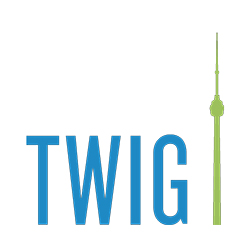October 2025 Labour Lowdown
TWIG
28 October 2025
Current Labour Market
$41.40
+9.3%
9.4%
-0.3% from August
$985.41 Mil
+$195.20 Mil
3,715,900
+18,500
18%
-0.2% Previous Quarter
19.1 Weeks
-26.3
31,301
+15% from August
Between September 2024 and September 2025, overall employment in the Toronto CMA rose modestly by about 18,000 jobs, or 0.5 percent. Growth was driven mainly by consumer-facing sectors. Accommodation and Food Services showed the strongest increase, adding roughly 13,500 positions (+7 percent) as tourism, events, and restaurant demand continued to rebound. Transportation and Warehousing also expanded slightly (+2,700 jobs) thanks to renewed movement of goods, steady e-commerce activity, and a late-summer uptick in freight and logistics. Together, these industries helped offset flat or declining results elsewhere in the economy.
The sharpest declines occurred in manufacturing and in business-support activities. Manufacturing employment fell by about 12,400 positions (-3.5 percent), reflecting weaker export orders, ongoing tariff uncertainty, and slower consumer-goods production. Business, Building and Other Support Services contracted by 8,100 jobs (-6.2 percent), suggesting reduced demand for administrative, janitorial, and temporary help services. In short, the city’s job base in 2025 tilted further toward service-sector work, particularly hospitality and transport, while industrial and support sectors lost ground amid continued structural and trade-related pressures.
Every month, TWIG will take a closer look at one of Toronto’s industry sectors. This month, we focus on our City’s Retail and Wholesale sector. Retail trade remains one of Toronto’s largest employment sectors, supporting roughly half a million jobs that range from warehouse operations and distribution to storefront sales, merchandising, and management. Between September 2024 and September 2025, employment in this sector was essentially flat, rising marginally from 499,600 to 500,200 after peaking at 537,900 in June. This pattern reflects the sector’s seasonal and cyclical nature: gains through spring and early summer tied to consumer demand and inventory restocking, followed by late-summer moderation as hiring cooled in response to slower retail traffic.
Despite overall stability, the year was marked by significant shifts within the industry. Several long-standing chains, including Hudson’s Bay, closed or consolidated locations as part of broader cost-cutting and e-commerce transitions, highlighting the continuing strain on department-store formats. At the same time, new entrants—particularly international fashion retailers, specialty grocers, and discount home-goods outlets—continued to open in major malls and suburban corridors. Together, these changes underscore how Toronto’s retail sector remains both a major employer and a mirror of the city’s shifting consumer economy, balancing legacy closures with steady churn and reinvestment in newer, more targeted retail formats.
Job posting data from JobsTO reinforces how central the retail sector remains to Toronto’s labour market. Of 3,644 active job postings, retail and related sales occupations dominate: retail salespersons and non-technical wholesale representatives (577 postings) lead the list, followed by retail and wholesale managers (381) and cashiers or other sales support roles (338). These front-line jobs form the backbone of Toronto’s large consumer economy, reflecting steady hiring for malls, big-box outlets, and independent retailers alike. Supervisory (128 postings) and customer service roles (99) indicate movement up the skills ladder, while smaller clusters in food preparation and health-support occupations show continued crossover between retail and service work.
Skills data point to the continued value of people-oriented and organizational competencies. “Communication” was cited in 627 postings, “management” in 574, and “sales” in 515, while customer service, leadership, and organization all ranked highly, evidence that employers prize soft skills as much as experience. Notably, over 3,100 postings listed no specific experience requirements, and more than 3,300 required no stated education, suggesting broad entry-level access and high turnover. Common requirements such as criminal record checks (165), Microsoft Office familiarity (84), and food safety certification (43) reflect both trust and compliance elements in the sector. Together, these figures describe a large but shifting retail labour market—one defined by accessibility, interpersonal skills, and continual adaptation to new technologies and service models.
Toronto’s retail and service hiring remains concentrated among major national brands. Loblaw Companies Limited led all employers with 392 postings, followed by TELUS (159), The Home Depot Canada (157), Walmart Canada (136), and Shoppers Drug Mart (133). Telecommunications giants like Bell and Rogers also posted heavily, while smaller but high-profile retailers such as Summerhill Market, Longo’s, Canada Goose, and Sephora rounded out the list. Together, these firms reflect the mix of grocery, home improvement, telecommunications, and fashion employers that anchor Toronto’s diverse consumer economy.
Author
-

Toronto Workforce Innovation Group is a non-profit and independent research organization devoted to finding and promoting solutions to employment-related problems in the Toronto Region.
View all posts